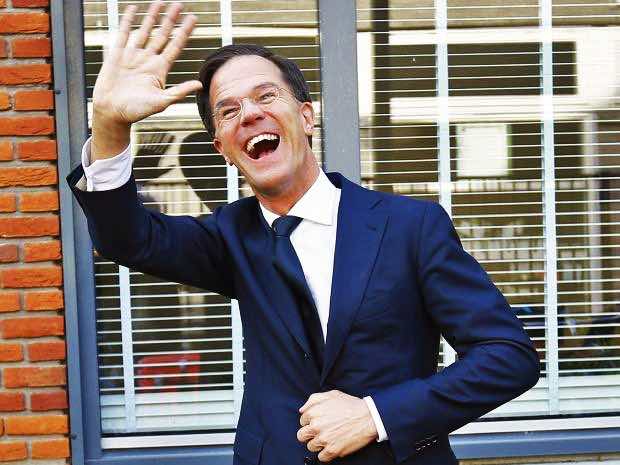A reassuring election result, the Dutch way
The Dutch have spoken. Even before the official election results are announced, one can conclude that Mark Rutte, with his liberal right VVD-party, has won by a landslide. It was an unexpected victory that caused great relief, not only in The Netherlands but in the whole of Europe. Last night both foreign media and state leaders were happy to conclude that the Dutch have halted the populist wave that has been rolling over Europe for a while, and that Geert Wilders’ hopes are crushed. One could question whether this conclusion is completely valid. Wilders, one of Europe’s most feared populists, might not have won last night, but his PVV party did gain enough support to make it the second largest party.

Never before has a Dutch parliamentary election received so much foreign media attention as it did on the eve of this vote. Politically moderate – some would even say boring – as the country has been during the last few decennia, the Dutch felt a little uncomfortable to be in the world’s spotlight. As hundreds of news outlets around the world gathered in The Hague, they all tried to make some sense of the somewhat exotic scene they were confronted with: an election in which no less than 26 political parties took part. Although The Netherlands has a longstanding tradition of multi-party politics and coalition governments, even the Dutch were a little dazzled by the number of choices on their ballot form. A unique electoral system and fierce political division made this possible.
The election’s result is quintessentially Dutch: voters left the country with a hugely fragmented parliament, with no party even coming close to an absolute majority. With 150 seats to divide in the Second Chamber (the lower house), the VVD only got 33. The PVV took second place with 20 seats, while the CDA (Christian Democrats) and D66 (a more progressive Democrats party) both grew to 19 seats.
As the dust settles, in the weeks and months to come parties will have to overcome their differences and form a coalition. This is not an easy task and it might take months. It will at least take 4 parties to create a majority coalition in the Second Chamber, which is already difficult enough. Extra complexity is added to this political jigsaw puzzle by the fact that a majority in the Second Chamber might not have enough support in the First Chamber (the Upper House). This leaves only a few workable options left: either a coalition between the VVD, CDA, D66, and both the CU and the SPG (two small slightly orthodox Christian parties), or a coalition between the VVD, CDA, D66 and GroenLinks (the Greens party, and the biggest winner on the left). I expect a new government only to be installed after the summer. Meanwhile, the public urge for change and effective government will linger on.
It is important not to misread the message the Dutch voters gave yesterday. Geert Wilders and his PVV might not have ended up first, but that doesn’t mean that the populists have lost completely, or that the Dutch have suddenly transformed from being Euro-sceptic to Euro-lovers. Acting as a radical opposition party during the past four years, the PVV has had a tremendous influence on the public debate about topics such as immigration, the EU and the Eurozone. A large part of the Dutch population has grown rather critical towards the Dutch Eurozone membership and the way in which Brussels is managing Europe. As a result, more established parties such as the VVD and the Christian Union (CU on the right, the CDA in the centre and the Socialist Party (SP) on the left, have also developed a more critical, not to say sceptical, tone towards Europe.
As the Financial Times rightly concluded some days ago, the Dutch people are rich, happy and discontent, especially about the EU. I believe this conclusion still stands after the election. One can be sure that, if the EU does not drastically reform, the people’s discontent will only become more mainstream. The outcome of the election is therefore not a vote of confidence in Europe, but merely one against the most vulgar form of protest that the PVV has been developing over the last few years.
For Europe, the political year 2017 has now finally begun. In Brussels, some are asking out loud if the Dutch electoral halt of extreme populism could form the starting point for a new “spring” for Europe. To explain last night’s result would be rather naive. A European spring, if one would define such a phenomenon as new confidence in both local and European governmental institutions, and new public confidence in further European cooperation, is still miles away.
The most important lesson from the election, and maybe from the other European elections in the months to come, is that we should regard populism as something that can be voted away, but which forms an enduring and influential element in our society. Geert Wilders and his PVV will not be part of the coalition that will govern The Netherlands in the years to come. But to those who will, as well as to other future leaders in Europe, I would say: keep an open dialogue, and above all, keep listening carefully to the populists’ concerns.
